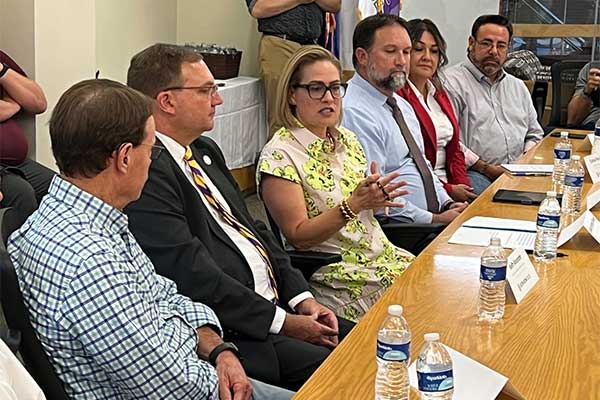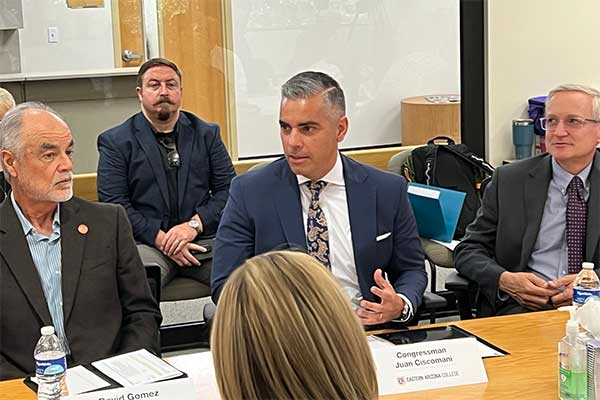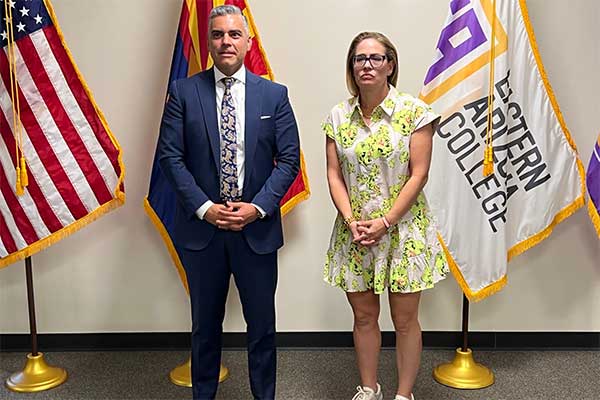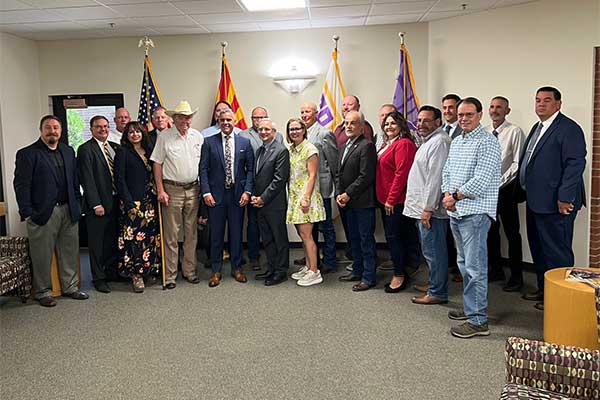Senator Kyrsten Sinema and Congressman Juan Ciscomani, today met with civic leaders from Graham and Greenlee Counties at EAC. Representatives from the Graham and Greenlee board of Supervisors as well as the mayors of Duncan, Clifton, Safford and Pima were present. City councils were also represented. Senator Sinema began the meeting by explaining that she wanted to hear about the needs of the communities so that she and her team can provide assistance. She discussed her rural development working group, which is designed to bring Arizonans together to provide lasting results and to ensure that her and her team are always hearing about the needs of the smaller communities.

The senator outlined some of the legislative things she’s working on including broadband development for rural areas, stopping the flow of drugs across the border. Sinema said that every community she visits talks about the impact of drugs coming across the border. She said that she’s working on legislation that will stop the flow of drugs across the border. She discussed the bill in particular that she and Congressman Ciscomani have been working on together called, “The Combating Cartels on Social Media Act,” which would allow the government to work with social media companies to crack down on cartels that are using social media to recruit teens to smuggle drugs and people to destination in the U.S.
Congressman Juan Ciscomani opened his remarks by pointing out that he is on the Veteran Affairs Committee and that his district has more than 70,000 veterans live in our district, which is the ninth largest veteran population in the country.

Ciscomani said that one of the most surprising things he’s seen since getting into congress is the bipartisan cooperation between parties. Ciscomani said he’s seen “people just willing to roll up their sleeves and put everything else aside” to get things done. He pointed out that the media generally doesn’t show that side of congress and that there’s a lot more common ground than he realized.
The rest of the time was turned over to the participants of the round table to present what they need, and how their senate and congressional representatives can help support them and their communities.
David Gomez, Greenlee County, discussed the need to sort out water rights. He also discussed the need for housing and infrastructure.
John Howard, Graham County, discussed the National Guard Armory that’s empty and deteriorating by the fairgrounds. He said that having a National Guard presence would help in many ways, including deterring illegal drugs coming into the area. He said that if the building was going to continue to sit empty, the county would like to have it for county use. He commented that the roads and infrastructure in the county are in need of maintenance and repair and expansion. He also touched on the need for broadband expansion.
Clifton Mayor, Laura Dorrell, discussed the need for technical education programs in engineering and robotics for their high students. EAC president, Todd Haney, offered to meet with her and set up programs through the college.
Thatcher Town Counciman, Mark Vining, discussed how dangerous Highway 70 has become between Safford and Globe and that improvements are needed to increase safety. As a funeral director, Vining said that there are times when our veterans are not well served. He said that sometimes veterans cannot get military honors at their graveside. Senator Sinema asked him to let them know when that happens and it will be taken care of. Both Sinema and Ciscomani serve on the Veterans Affairs Committee.
Safford City Council member, Luke Arbizo, discussed road maintenance and infrastructure needs. He commented on the Safford Downtown Association and the need for small business support.
James Bryce, representing the AZ School Board Association, mentioned the current teacher shortage and the need for better teacher support. Bryce said, “I have teachers teaching the American dream and can’t live the American dream.”
Corina Reyes, Chamber of Commerce president, discussed Broadband expansion and tourism grants.
Pima Mayor, Brian Paull, thanked the senator and congressman for a $2 million grant for the Pima fire station. He pointed out that the town is growing but there are not many businesses there and their tax base is very low. He stressed the need for grants and financial support.
Keith Alexander, EAC, pointed out that housing for EAC students is at capacity. “We have students that want to come here,” Alexander said. “We don’t have a place for them to live. Just last week we had a young lady in St. Johns and a young man in Springerville that both turned down scholarships to come here and go to school because our housing is full. They couldn’t find any housing.”
Duncan Mayor, Alex Blake, said that 70% of their funding comes from grants because there is very little tax base for the town. He said there’s a need to build a levy around the river to prevent flooding. He also discussed the need for expanded broadband coverage and pointed out that during the pandemic some of their aging population needed to have telemedicine appointments but didn’t have Internet available to make that possible.
Safford Mayor, Jason Kouts, discussed the need to work on water rights with tribal leaders. He also discussed the drug problem and gave Ciscomani and Sinema a book and a movie about his son, who lost his life through drugs.

Following the meeting, Sinema and Ciscomani took questions from the press. When asked what they would like their constituents in our area to know, Sinema said, I think the first message I would give to the folks in Graham and Greenlee Counties, is for them to know that they’re federal government is working for them. So, Juan and I are working together in partnership to make sure that we’re delivering real results for folks in rural Arizona. You know, one of the things we heard today was that people in rural Arizona often feel forgotten and left behind. What I want them to know is they’ve got a fighter in the senate and a fighter in the house who are making sure they’re not left behind.”
“Same message,” Ciscomani echoed. “When I was in the campaign, I came here over and over again and that’s the message that I heard. ‘Nobody pays attention, people don’t come and visit – especially the congress,’ so I said, I’ll be here, I’ll be present and, of course, Kyrsten’s here as well. We’re here together to report on positive results that we’ve actually worked on together. So, it’s not just all talk. We’re giving examples of specific areas where we’ve worked together and delivered our results.









